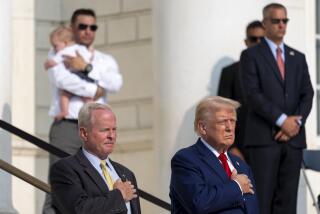BUCHANAN: Aide Reportedly Wrote, ‘Succumbing to Pressure of Jews,’ in Meeting
- Share via
WASHINGTON — Three months into his job and an ocean away from the traveling White House, President Reagan’s public relations chief found himself embroiled Friday in the same controversy that has enveloped Reagan’s current European tour.
The dispute over notes that the aide, Patrick J. Buchanan, reportedly scribbled about the President’s visit Sunday to the German war cemetery at Bitburg and its potential political impact left some of his critics in Washington wondering how long he will remain as White House director of communications--a title that belies the long reach of his jurisdiction.
Neither current nor former Administration officials would allow themselves to be quoted by name about Buchanan, whose combative style already has placed him at the center of several contentious disputes. But one former White House official who has maintained close contact with several of his ex-colleagues declared: “A lot of people are giving him six months.”
‘Shroud of Mystery’
Similarly, a current White House official predicted that Buchanan will be out of office within a year.
Buchanan, who has been reluctant to speak with reporters, has wrapped himself in what another former White House official called a “shroud of mystery.” On Friday, he did not return a call seeking comment on the notes.
In a report broadcast Thursday night by NBC News, Buchanan was said to have repeatedly written the phrase “succumbing to the pressure of the Jews” during a White House meeting.
The session, which one source said took place in the office of White House Chief of Staff Donald T. Regan a few weeks ago, was reported to have dealt with the furor that has built up over Reagan’s decision to visit the cemetery, where the remains of 49 members of Hitler’s Waffen SS troops are buried.
Buchanan said in a written statement issued by the White House that the meeting was with Jewish leaders, who “made the point that whatever the President did, it was important he not be perceived as having succumbed to pressure.”
“I scribbled notes on what they said. To suggest that fragments of my note-taking on what they said can thereby be construed as representing my position is not only misleading, it is downright silly,” he said in the statement.
A former political columnist and broadcast commentator and a speech writer in the Richard M. Nixon Administration, Buchanan was appointed to his job by Regan on Feb. 5. He has taken a hard line in arguing strategy approaches to be followed in some of the President’s major battles with Congress--and he has been the focus of controversy before.
Guiding the preparation of the President’s speeches, he was said to have proposed some of the most favorable language Reagan has used to describe rebels fighting Nicaragua’s leftist regime. More recently, he lost a battle to national security adviser Robert C. McFarlane, who apparently succeeded in winning approval for a Bitburg text promoting reconciliation between Germans and Americans.
Buchanan’s supporters, however, portray him as a team player ready to support Administration policy even after losing an argument. And his allies, according to one source, have sought to soften criticism of him by “saying he’s not as powerful” as some believe.
Nonetheless, one official credited Buchanan with playing important roles in winning support for funding for the MX missile and for Reagan’s veto of emergency farm aid. “He’s close to Regan,” this official said. “He’s close to the President. He’s not afraid to speak up in the inner councils, and that may rankle a few people.”
Sources familiar with the work of the senior White House staff portray the arrival of Regan and Buchanan as a sharp shift in the way the President’s closest aides intend to carry out the intertwined business of governing and politics.
In one of the harshest characterizations of Buchanan, such phrases as “Nixonian mentality . . . bull in a china closet . . . believes in confrontational politics . . . overpowered virtually everybody in the White House” were used.
“It’s the Nixonization of Ronald Reagan. I think it’s happening,” warned one former Administration official, adding that Buchanan and other members of the new team assembled for Reagan’s second term are “still waiting for Nixon to walk in and lead them in the White House.”
Under James A. Baker III, who traded jobs with Regan and became secretary of the Treasury, and Michael K. Deaver, the departing deputy chief of staff whose duties, to some extent, are being taken over by Buchanan, the White House staff developed a reputation for following a politically pragmatic approach.
It toned down Reagan’s occasional outbursts in White House meetings and sought compromises that allowed him to accomplish a massive Pentagon buildup as well as cuts in the overall growth of the federal budget.
That image, of a staff avoiding ideological confrontation, is changing. Now, Regan and Buchanan are seen as the equivalent of bare-knuckled street fighters always ready for a political brawl.
And, according to one account, when Buchanan angrily argues a point in White House meetings, “there’s nobody who pounds the table and says, ‘You’re out of your mind.’ ”
One former official, referring to Reagan’s history of supporting aides under fire, said that the President may “tough it out” and stick with his controversial communications director.
Another former Reagan aide, defending Buchanan, remarked: “He’s not been in there trying to run the President off a cliff, but anything that looks right-wing, he’s getting blamed for.”
More to Read
Get the L.A. Times Politics newsletter
Deeply reported insights into legislation, politics and policy from Sacramento, Washington and beyond. In your inbox twice per week.
You may occasionally receive promotional content from the Los Angeles Times.










